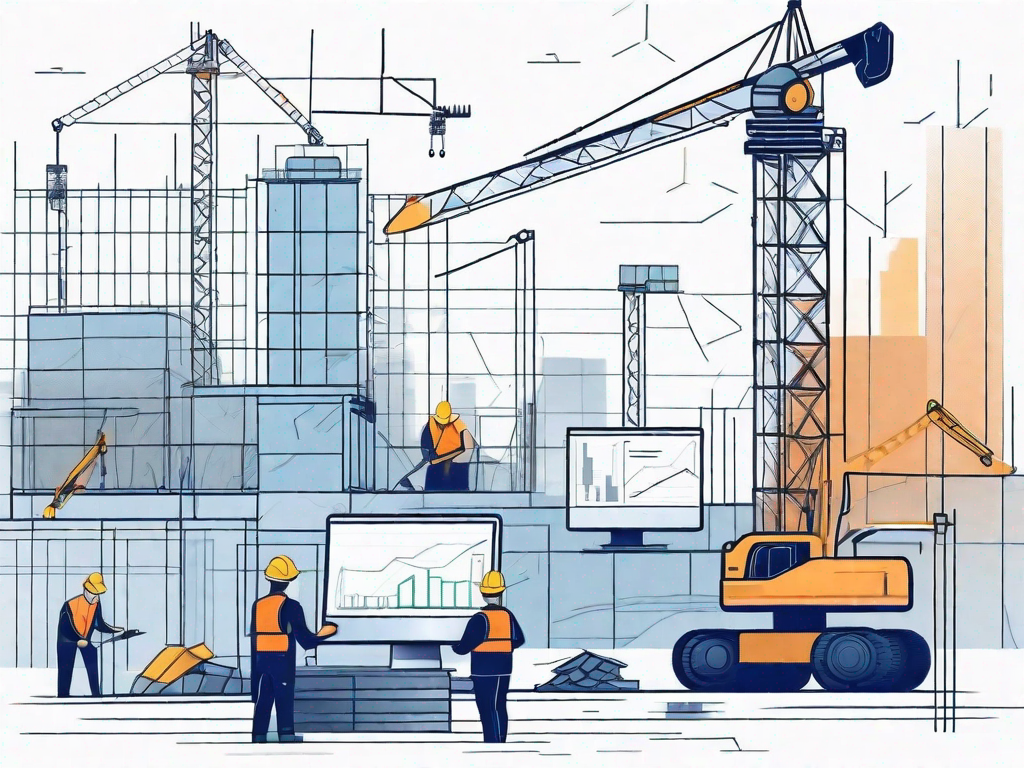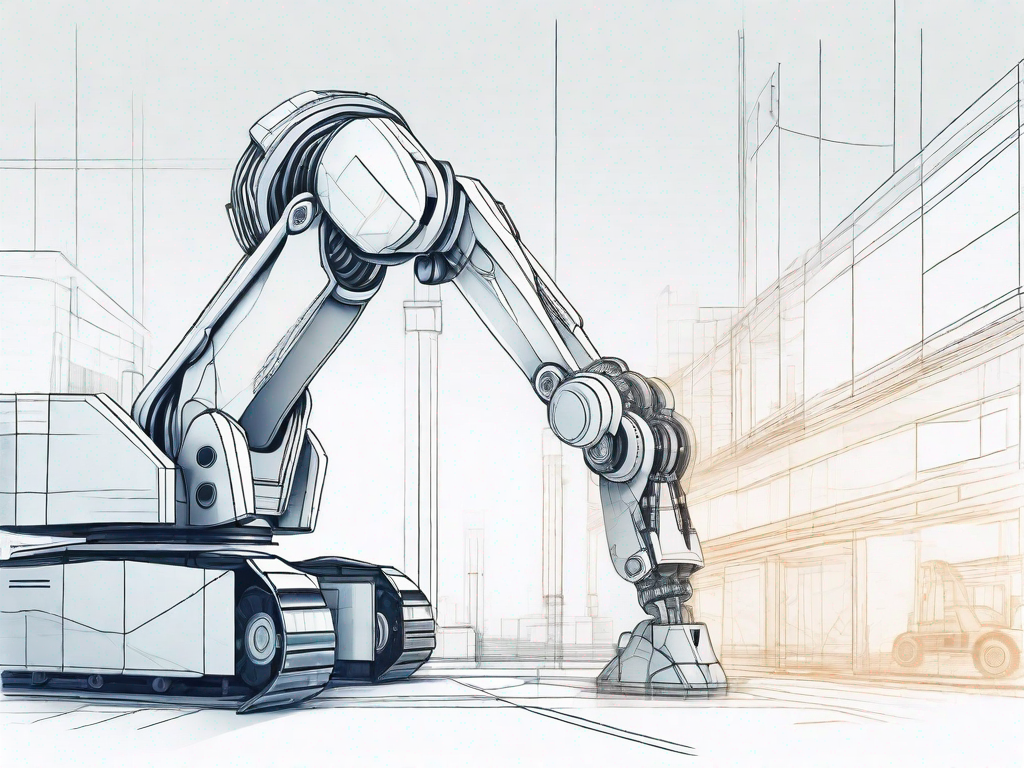Inventory Insights: Leveraging AI for Construction Stock Management
Effective stock management is crucial for the success of construction projects. With the high cost of construction materials and the need for timely delivery, construction companies cannot afford to overlook the importance of efficient inventory tracking. However, managing stock in the construction industry comes with its own set of challenges that can hinder productivity and profitability. This is where artificial intelligence (AI) can play a significant role in revolutionizing stock management practices.
The Importance of Effective Stock Management in Construction Projects
Construction projects rely heavily on the availability of materials at the right time and in the right quantity. A delay in material delivery or a shortage of stock can lead to project delays and increased costs. Therefore, it is essential for construction companies to have a well-defined stock management system in place.
One of the key benefits of effective stock management is improved project planning and coordination. When materials are properly tracked and managed, project managers can accurately estimate timelines and ensure that the required materials are available when needed. This minimizes the risk of project delays and keeps the construction schedule on track.
Moreover, effective stock management also contributes to cost control. By monitoring stock levels and optimizing inventory, construction companies can avoid unnecessary stockouts or overstocks. This prevents wastage and reduces the need for emergency purchases, which are often more expensive. With proper stock management, construction projects can be executed within budget, maximizing profitability for the company.
Understanding the Challenges of Construction Stock Management
Managing stock in the construction industry is not without its challenges. Construction projects often involve multiple sites, which can make tracking and transferring stock between locations a complex task. Additionally, the dynamic nature of construction projects requires real-time monitoring and quick decision-making to ensure that there are no stockouts or overstocks.
Furthermore, construction companies often deal with a wide range of materials, equipment, and tools, each with its own unique characteristics and requirements. Keeping track of all these items and ensuring their availability can be overwhelming without the right tools and systems in place.
For instance, construction projects may require different types of concrete, such as ready-mix concrete or precast concrete, depending on the specific requirements of the project. Each type of concrete has its own curing time and strength characteristics, which need to be taken into account when managing stock. Failure to properly manage and coordinate the availability of these materials can result in construction delays and compromised structural integrity.
Similarly, construction projects often require specialized equipment and tools, such as cranes, excavators, and power tools. These items need to be properly maintained and serviced to ensure their availability and performance. Effective stock management involves not only tracking the quantity of these items but also monitoring their condition and scheduling maintenance activities to prevent breakdowns and unexpected downtime.
The Role of Artificial Intelligence in Stock Management
Artificial intelligence offers a solution to the complexities of construction stock management. AI algorithms can analyze vast amounts of data from various sources to provide valuable insights and automate many stock management processes. By leveraging AI, construction companies can overcome the challenges associated with stock management and achieve significant improvements in efficiency and accuracy.
AI can help construction companies predict stock demand based on historical data and project requirements. This enables more accurate planning and ordering of materials, reducing the risk of stockouts or overstocks. Additionally, AI-powered systems can optimize inventory levels by continuously monitoring usage patterns and adjusting stock levels accordingly.
Furthermore, AI can enhance the tracking and transfer of stock between different construction sites. By analyzing real-time data on stock availability and project progress, AI algorithms can recommend the most efficient routes and timing for stock transfers. This minimizes transportation costs and ensures that materials are delivered to the right location at the right time, improving overall project coordination.
In conclusion, effective stock management is crucial for the success of construction projects. It enables accurate project planning, cost control, and efficient coordination of materials and resources. With the help of artificial intelligence, construction companies can overcome the challenges associated with stock management and achieve higher levels of efficiency and accuracy.
Benefits of AI in Construction Stock Management
Implementing AI in construction stock management can bring numerous benefits to construction companies. Let's explore some of these advantages:
Improved Accuracy and Efficiency in Inventory Tracking
Manual stock tracking is prone to errors and can be time-consuming. AI can automate inventory tracking by using barcode or RFID scanning technology. This eliminates the need for manual counting and minimizes the risk of human error. AI-powered systems can also update stock levels in real-time, ensuring accurate and up-to-date information for project managers and procurement teams.
In addition to accuracy, AI-powered inventory tracking systems can significantly improve efficiency. With AI, construction companies can track stock levels and locations more quickly and easily. This allows for faster retrieval of materials and reduces the time spent searching for specific items. By streamlining the inventory tracking process, AI enables construction companies to optimize their operations and improve overall productivity.
Real-Time Monitoring and Predictive Analytics for Stock Levels
With AI, construction companies can monitor stock levels in real-time, allowing for proactive decision-making. AI algorithms can analyze historical data to predict future stock demand and highlight potential stock shortages or excesses. This enables construction companies to take necessary actions in advance and prevent costly disruptions to project timelines.
Furthermore, AI-powered systems can provide construction companies with valuable insights through predictive analytics. By analyzing data from various sources, including past project data, market trends, and external factors, AI can help construction companies make informed decisions regarding stock management. This includes identifying optimal stock levels, determining reorder points, and even predicting the impact of external factors, such as weather conditions or supply chain disruptions, on stock availability.
Streamlined Procurement and Supply Chain Management
AI can streamline procurement processes by automating various tasks. AI-powered systems can analyze supplier performance, generate purchase orders, and even negotiate prices based on market trends. This not only saves time but also ensures that construction companies make informed decisions when it comes to selecting suppliers and managing the supply chain.
Additionally, AI can enhance supply chain visibility and transparency. By integrating AI-powered systems with supplier databases and logistics platforms, construction companies can gain real-time insights into the status of their orders, shipments, and deliveries. This enables effective tracking of materials and ensures that construction projects are supplied with the necessary resources on time.
Moreover, AI can contribute to sustainability efforts in procurement and supply chain management. By analyzing data on supplier practices and materials used, AI can help construction companies make environmentally conscious decisions. This includes selecting suppliers with sustainable practices, sourcing eco-friendly materials, and optimizing transportation routes to reduce carbon emissions.
In conclusion, the implementation of AI in construction stock management offers a wide range of benefits. From improved accuracy and efficiency in inventory tracking to real-time monitoring and predictive analytics for stock levels, and streamlined procurement and supply chain management, AI empowers construction companies to optimize their operations, make informed decisions, and achieve better project outcomes.
Implementing AI Solutions for Construction Stock Management
Implementing AI in construction stock management requires careful planning and consideration. Here are some key factors to consider:
Choosing the Right AI Technology for Your Construction Business
There are various AI technologies available for construction stock management, ranging from inventory tracking software to machine learning algorithms. It is important to assess your business needs and select the AI technology that aligns with your objectives. Consider factors such as scalability, integration capabilities, and ease of use when making your decision.
Integrating AI with Existing Stock Management Systems
If your construction business already has a stock management system in place, it is crucial to ensure seamless integration with the AI solution. This may require data migration, system updates, or customization to make the transition smooth and efficient. Consult with AI experts and your IT team to develop a comprehensive integration plan.
Training and Adoption of AI Tools for Construction Stock Management
Introducing AI tools to your construction workforce may require training and change management initiatives. It is essential to provide adequate training and support to employees to ensure the successful adoption of AI in stock management. Communicate the benefits of AI and address any concerns or resistance from team members to ensure a smooth transition.
Case Studies: Successful Implementation of AI in Construction Stock Management
Let's take a look at some real-world examples of how construction companies have leveraged AI for stock management:
Company A: Reducing Costs and Minimizing Stockouts with AI
Company A, a large construction firm, implemented AI-powered inventory tracking systems across multiple project sites. By accurately predicting stock demand and optimizing inventory levels, they were able to reduce stockouts by 30% and eliminate overstocks. This resulted in significant cost savings and improved project efficiency.
Company B: Optimizing Inventory Levels and Reducing Waste with AI
Company B, a mid-sized construction company, integrated AI algorithms into their stock management system. By analyzing usage patterns and project requirements, they were able to optimize inventory levels and reduce waste. This not only reduced storage costs but also minimized the environmental impact of excess stock disposal.
Company C: Enhancing Project Efficiency and Timelines with AI
Company C, a small construction company, implemented AI-powered real-time monitoring systems for stock levels. This allowed them to proactively manage stock shortages and coordinate with suppliers for timely deliveries. As a result, they experienced improved project efficiency and met project timelines consistently.
In conclusion, leveraging AI for construction stock management can bring significant benefits to construction companies. From improved accuracy and efficiency in inventory tracking to streamlined procurement and supply chain management, AI has the potential to revolutionize stock management practices in the construction industry. However, successful implementation of AI requires careful planning, integration with existing systems, and training and adoption by the workforce. By embracing AI, construction companies can optimize stock management processes and achieve greater project success.





